新概念英语第一册 Lesson 91-92 (共37张PPT)
文档属性
| 名称 | 新概念英语第一册 Lesson 91-92 (共37张PPT) |

|
|
| 格式 | pptx | ||
| 文件大小 | 1.0MB | ||
| 资源类型 | 教案 | ||
| 版本资源 | 新概念英语 | ||
| 科目 | 英语 | ||
| 更新时间 | 2024-07-30 00:00:00 | ||
图片预览

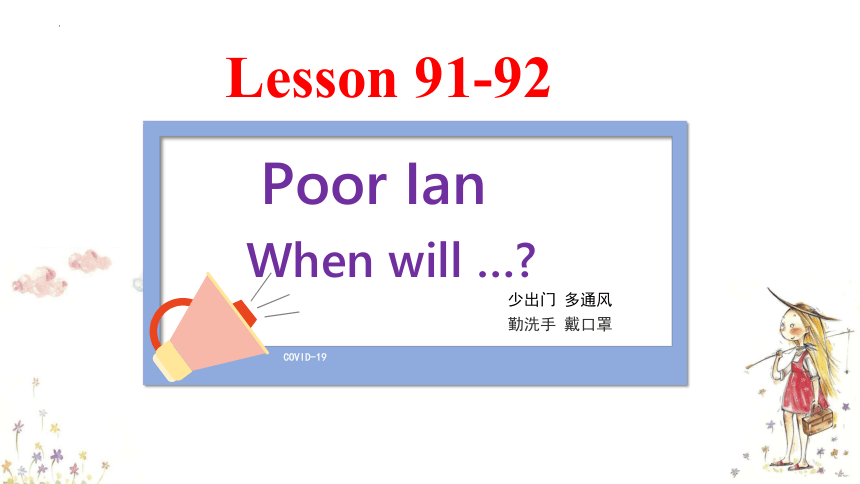
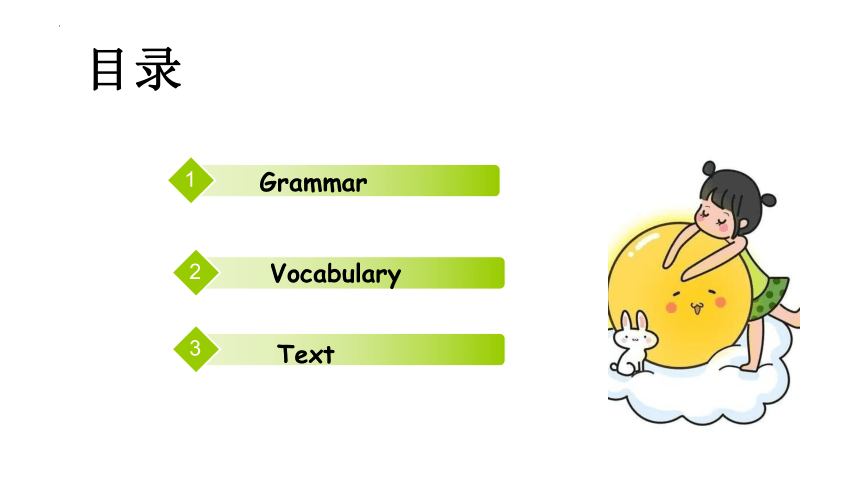
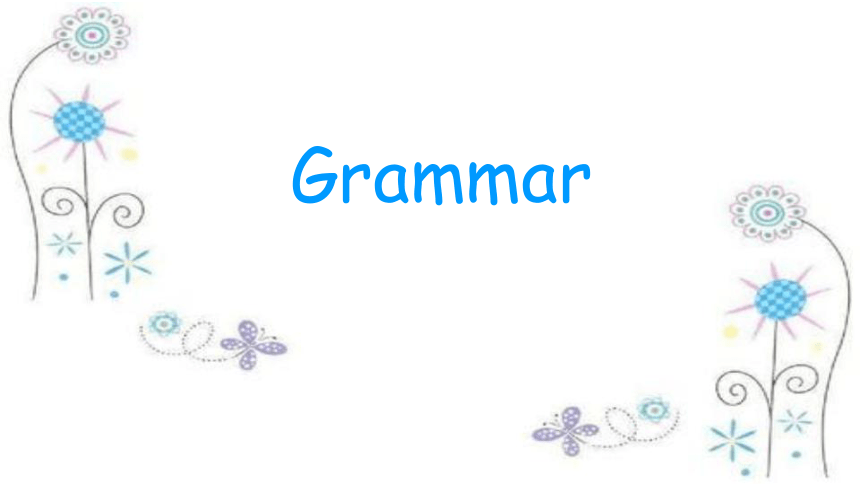
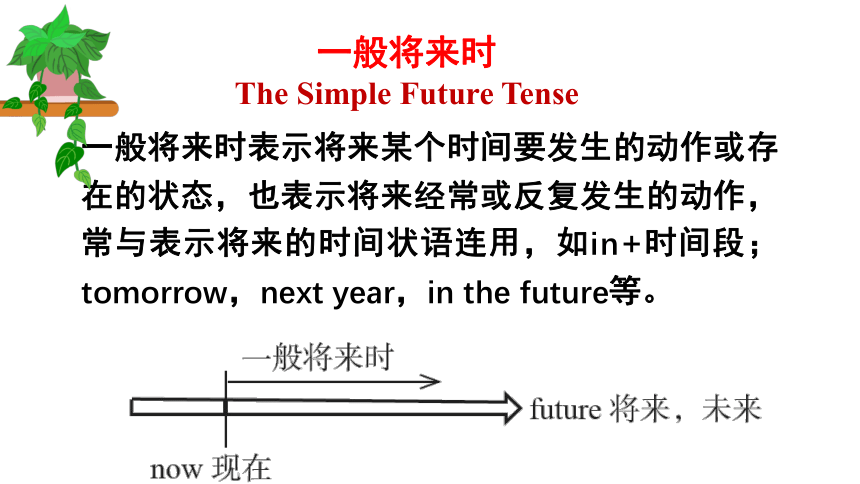
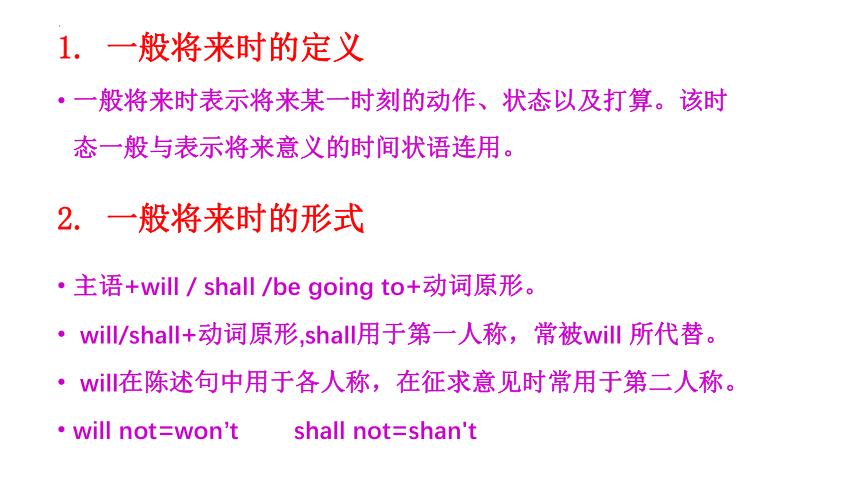

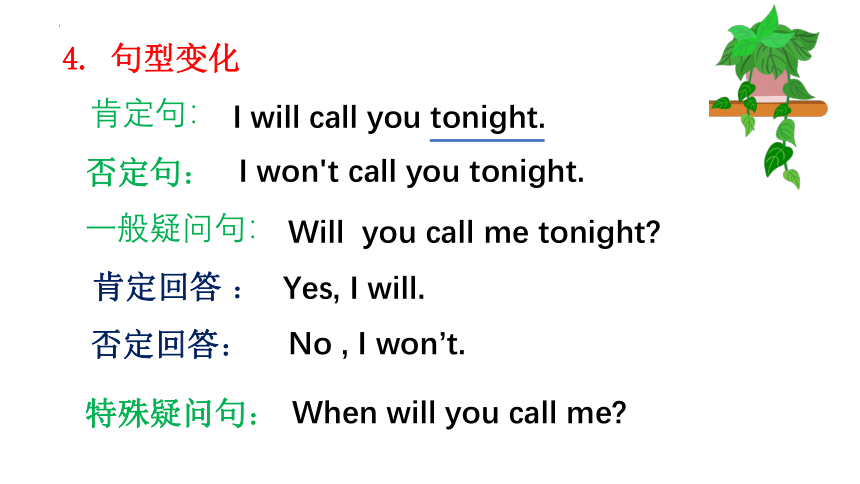
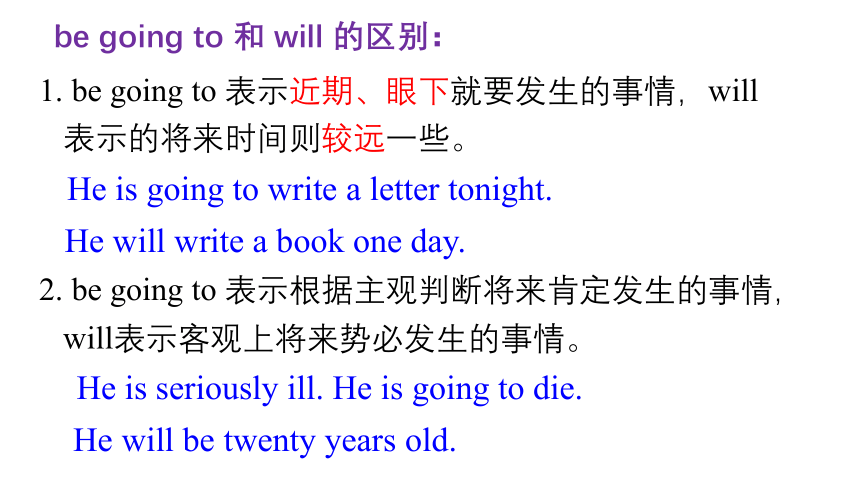
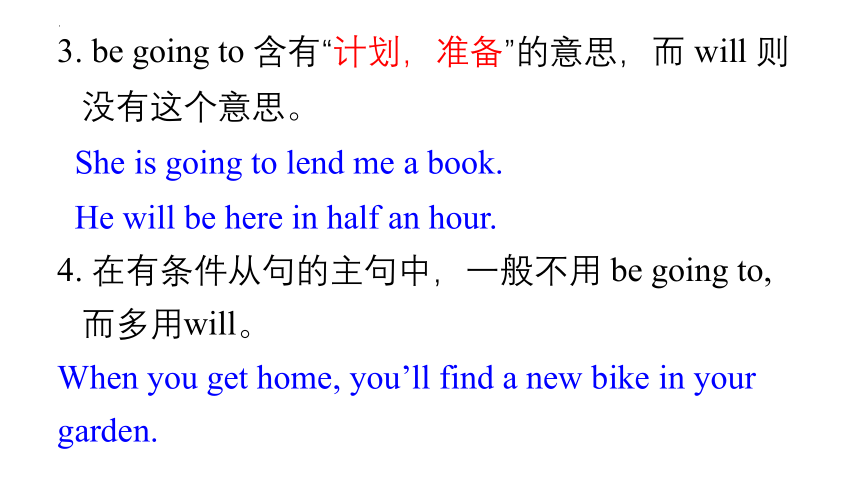
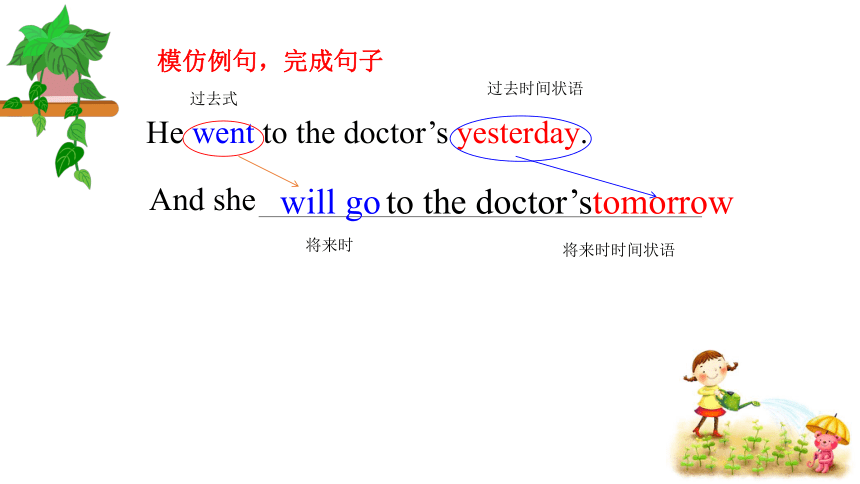
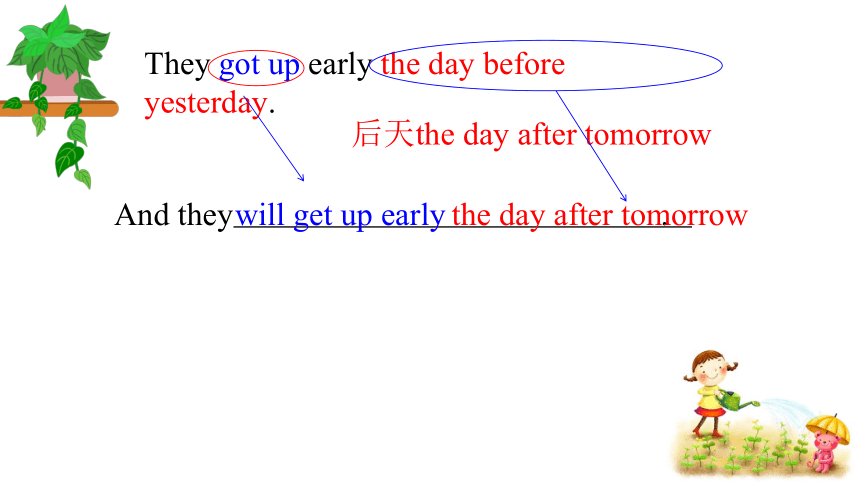
文档简介
(共37张PPT)
少出门 多通风
勤洗手 戴口罩
Lesson 91-92
Lesson 91-92
COVID-19
少出门 多通风
勤洗手 戴口罩
Poor Ian
When will …
Grammar
1
Vocabulary
2
Text
3
目录
Grammar
一般将来时
The Simple Future Tense
一般将来时表示将来某个时间要发生的动作或存在的状态,也表示将来经常或反复发生的动作,常与表示将来的时间状语连用,如in+时间段;tomorrow,next year,in the future等。
1. 一般将来时的定义
一般将来时表示将来某一时刻的动作、状态以及打算。该时态一般与表示将来意义的时间状语连用。
2. 一般将来时的形式
主语+will / shall /be going to+动词原形。
will/shall+动词原形,shall用于第一人称,常被will 所代替。
will在陈述句中用于各人称,在征求意见时常用于第二人称。
will not=won’t shall not=shan't
3. 时间标志
记一记!
I will be at home at seven o’clock this evening. 今晚七点我在家。
tomorrow 明天
this month 本月
the day after tomorrow 后天
next week 下周
in two days’ time 两天之后
from now on 从现在起
in the future 将来
4. 句型变化
肯定句:
I will call you tonight.
否定句:
I won't call you tonight.
一般疑问句:
肯定回答 :
否定回答:
Yes, I will.
No , I won’t.
特殊疑问句:
When will you call me
Will you call me tonight
1. be going to 表示近期、眼下就要发生的事情,will 表示的将来时间则较远一些。
He is going to write a letter tonight.
He will write a book one day.
2. be going to 表示根据主观判断将来肯定发生的事情,will表示客观上将来势必发生的事情。
He is seriously ill. He is going to die.
He will be twenty years old.
be going to 和 will 的区别:
3. be going to 含有“计划,准备”的意思,而 will 则没有这个意思。
She is going to lend me a book.
He will be here in half an hour.
4. 在有条件从句的主句中,一般不用 be going to, 而多用will。
When you get home, you’ll find a new bike in your garden.
He went to the doctor’s yesterday.
And she
will go
to the doctor’s
tomorrow
模仿例句,完成句子
过去式
将来时
过去时间状语
将来时时间状语
They got up early the day before yesterday.
And they .
will get up early
后天the day after tomorrow
the day after tomorrow
She telephoned him last night.
We swept the floor last week.
And she will telephone him tonight.
And we will sweep the floor this week.
New words and expressions
still adv. 还,仍旧
move v. 搬家
miss v. 想念,思念
neighbour n. 邻居
person n. 人
people n. 人们
poor adj. 可怜的
New words and expressions
still adv.
1. 还,仍旧
I still can’t decide where to go.
我还是不能决定去哪儿。
She was still beautiful at the age of 46.
她46岁时依然美丽。
I still use the watch you gave me.
我还在用你给我的那块表。
2. 静止地;安静地
He is sitting still.
他一动不动地坐着。
The patient is lying still.
病人安静地躺着。
Please stand still !
请站好别动!
move
1. v.搬家
move from …to… 从…搬到…
They moved from Nanjing to Shenzhen.
他们从南京搬到深圳。
2. v.使感动,使动心
Her song moved us greatly.
她的歌深深地打动了我们。
3. v.移动
Don’t move that chair,because I’ve just painted it !
请不要搬动那张椅子,因为我刚刚刷过油漆。
move to
move sth. away
move on
move about
move in
move out
朝前走;继续移动
走来走去
迁出
搬到…
迁入
搬开;移走
miss
1. v.想念,思念
We will miss you very much if you move.
如果你搬家,我们会想你的。
I really miss my hometown.
我真的很想念我的家乡。
2. v.错过,失去机会
I missed a good chance.
我失去一次机会。
They missed the bus and walked home.
他们没有赶上公交就走回家了。
miss doing 未能做某事
I missed buying the magazine.
我没有买到这本杂志。
I missed seeing him yesterday.
昨天我没能看到他。
neighbor
n.邻居
He and I are next-door neighbors.
他和我比邻而居。
a good neighbor 好邻居
引申词:neighborhood 四邻,邻近地区
This is a quiet neighborhood.
这一带很安静。
He is moving into the neighborhood.
他要搬到这一带。
person n.人
He is a nice person.
他是个好人。
Who is that person?
那个人是谁?
in person 亲自,直接地
He will go to get the money in person.
他将亲自去取钱。
引申词:personal adj. 个人的,私人的
a personal conversation 私人谈话
people n.人们
There are a lot of people in the street.
街上有很多人。
the people 民众,人民,国民
poor adj.
1. 可怜的
The poor old woman had no money.
那个可怜的老人没有钱.
2. 贫穷的 引申词:rich adj.富有的
a poor man 贫穷的人 a poor village 贫穷的村庄
the poor 穷人(用作复数)
We should help the poor.
我们应该帮助穷人。
3. 笨拙的,差劲的
sth
be poor at
不擅长….. doing sth
My daughter is poor at swimming.
我女儿不擅长游泳。
Dialogue analysis
1. Has Ian sold his house yet
Yes, he has. He sold it last week.
2. Has he moved to his new house yet
No, he hasn't.
3. When is he going to move
He is going to move tomorrow afternoon.
4. Is he a very nice person
Yes, he is.
Read and Answer
CATHERING: Has Ian sold his house yet
JENNY: Yes, he has. He sold it last week.
★yet 己经(疑问句)
yet 还 ( 否定句)
already (肯定句)
My father has already come home form work.
我的父亲己经下班回到了家。
(already置于助动词与实义动词之间)
Has your father come home yet
你的父亲己经下班到家了吗?
(yet一般放在句末)
CATHERING: Has he moved to his new house yet
JENNY: No, not yet. He's still here. He's going to move tomorrow.
★move to 搬到…
我明天要搬到B区的办公室。
I'll move to the office in zone B tomorrow.
★ yet用于疑问句和否定句的句尾。
No, he has not moved to his new house yet.
★ He is still here.
副词still也可用于一般现在时, 注意位置在be动词之后。
Things can still get better.
情况还是会好转的。
★ be going to do 计划、打算做某事
一般指已经计划好的事情,而且是主语本身主动要做的事情
他今晚打算写封信。
He is going to write a letter tonight.
CATHERING: When Tomorrow morning
JENNY: No. Tomorrow afternoon. I'll miss him. He has always been a good neighbour.
LINDA: He's a very nice person. We'll all miss him.
★ miss
我很想家.
I miss home very much.
I miss you because I missed you.
我如此想念你,因为我们曾经彼此错过。
★ nice
表达人的人品很好可以用good或nice。
他是个好人。
He's a good guy.=He is a nice man.
all 在家,全部(指3个或3个以上的人或物)
They all like English.
他们所有的人都有喜欢英语。
both 都 (用来指2个人或物)
Both Mr. Smith and Miss Lee are from Brazil. Smith.
先生和李小姐都是巴西人。
CATHERING: When will the new people move into this house
JENNY: I think that they'll move in the day after tomorrow.
LINDA: Will you see Ian today, Jenny
JENNY: Yes, I will.
★ people = neighbours
She’s the right person for this job.
她是这个职位的合适人选。
★ move to = move into 搬进
★ the day after tomorrow 后天
the day after tomorrow in the morning
后天早上
the day after tomorrow in the afternoon
后天下午
the day after tomorrow in the evening
后天傍晚
the night after next
后天晚上
LINDA: Please give him my regards.
CATHERING: Poor Ian! He didn't want to leave this house.
JENNY: No, he didn't want to leave, but his wife did!
★ give sb. sth. = give sth. to sb.
给某人某物=把某物给某人
Please give your parents our regards.
Please give our regards to your parents.
请代我们问候你的父母。
★ poor adj. 可怜的
可怜的女孩
poor girl
★ poor adj. 贫穷的
贫穷的国家
the poor country
★ leave 离开
leave… for… 离开… 去…
When will you leave China for England
你什么时候离开中国去英国?
leave for 动 身去…
I will leave for England on September
23rd.
少出门 多通风
勤洗手 戴口罩
Lesson 91-92
Lesson 91-92
COVID-19
少出门 多通风
勤洗手 戴口罩
Poor Ian
When will …
Grammar
1
Vocabulary
2
Text
3
目录
Grammar
一般将来时
The Simple Future Tense
一般将来时表示将来某个时间要发生的动作或存在的状态,也表示将来经常或反复发生的动作,常与表示将来的时间状语连用,如in+时间段;tomorrow,next year,in the future等。
1. 一般将来时的定义
一般将来时表示将来某一时刻的动作、状态以及打算。该时态一般与表示将来意义的时间状语连用。
2. 一般将来时的形式
主语+will / shall /be going to+动词原形。
will/shall+动词原形,shall用于第一人称,常被will 所代替。
will在陈述句中用于各人称,在征求意见时常用于第二人称。
will not=won’t shall not=shan't
3. 时间标志
记一记!
I will be at home at seven o’clock this evening. 今晚七点我在家。
tomorrow 明天
this month 本月
the day after tomorrow 后天
next week 下周
in two days’ time 两天之后
from now on 从现在起
in the future 将来
4. 句型变化
肯定句:
I will call you tonight.
否定句:
I won't call you tonight.
一般疑问句:
肯定回答 :
否定回答:
Yes, I will.
No , I won’t.
特殊疑问句:
When will you call me
Will you call me tonight
1. be going to 表示近期、眼下就要发生的事情,will 表示的将来时间则较远一些。
He is going to write a letter tonight.
He will write a book one day.
2. be going to 表示根据主观判断将来肯定发生的事情,will表示客观上将来势必发生的事情。
He is seriously ill. He is going to die.
He will be twenty years old.
be going to 和 will 的区别:
3. be going to 含有“计划,准备”的意思,而 will 则没有这个意思。
She is going to lend me a book.
He will be here in half an hour.
4. 在有条件从句的主句中,一般不用 be going to, 而多用will。
When you get home, you’ll find a new bike in your garden.
He went to the doctor’s yesterday.
And she
will go
to the doctor’s
tomorrow
模仿例句,完成句子
过去式
将来时
过去时间状语
将来时时间状语
They got up early the day before yesterday.
And they .
will get up early
后天the day after tomorrow
the day after tomorrow
She telephoned him last night.
We swept the floor last week.
And she will telephone him tonight.
And we will sweep the floor this week.
New words and expressions
still adv. 还,仍旧
move v. 搬家
miss v. 想念,思念
neighbour n. 邻居
person n. 人
people n. 人们
poor adj. 可怜的
New words and expressions
still adv.
1. 还,仍旧
I still can’t decide where to go.
我还是不能决定去哪儿。
She was still beautiful at the age of 46.
她46岁时依然美丽。
I still use the watch you gave me.
我还在用你给我的那块表。
2. 静止地;安静地
He is sitting still.
他一动不动地坐着。
The patient is lying still.
病人安静地躺着。
Please stand still !
请站好别动!
move
1. v.搬家
move from …to… 从…搬到…
They moved from Nanjing to Shenzhen.
他们从南京搬到深圳。
2. v.使感动,使动心
Her song moved us greatly.
她的歌深深地打动了我们。
3. v.移动
Don’t move that chair,because I’ve just painted it !
请不要搬动那张椅子,因为我刚刚刷过油漆。
move to
move sth. away
move on
move about
move in
move out
朝前走;继续移动
走来走去
迁出
搬到…
迁入
搬开;移走
miss
1. v.想念,思念
We will miss you very much if you move.
如果你搬家,我们会想你的。
I really miss my hometown.
我真的很想念我的家乡。
2. v.错过,失去机会
I missed a good chance.
我失去一次机会。
They missed the bus and walked home.
他们没有赶上公交就走回家了。
miss doing 未能做某事
I missed buying the magazine.
我没有买到这本杂志。
I missed seeing him yesterday.
昨天我没能看到他。
neighbor
n.邻居
He and I are next-door neighbors.
他和我比邻而居。
a good neighbor 好邻居
引申词:neighborhood 四邻,邻近地区
This is a quiet neighborhood.
这一带很安静。
He is moving into the neighborhood.
他要搬到这一带。
person n.人
He is a nice person.
他是个好人。
Who is that person?
那个人是谁?
in person 亲自,直接地
He will go to get the money in person.
他将亲自去取钱。
引申词:personal adj. 个人的,私人的
a personal conversation 私人谈话
people n.人们
There are a lot of people in the street.
街上有很多人。
the people 民众,人民,国民
poor adj.
1. 可怜的
The poor old woman had no money.
那个可怜的老人没有钱.
2. 贫穷的 引申词:rich adj.富有的
a poor man 贫穷的人 a poor village 贫穷的村庄
the poor 穷人(用作复数)
We should help the poor.
我们应该帮助穷人。
3. 笨拙的,差劲的
sth
be poor at
不擅长….. doing sth
My daughter is poor at swimming.
我女儿不擅长游泳。
Dialogue analysis
1. Has Ian sold his house yet
Yes, he has. He sold it last week.
2. Has he moved to his new house yet
No, he hasn't.
3. When is he going to move
He is going to move tomorrow afternoon.
4. Is he a very nice person
Yes, he is.
Read and Answer
CATHERING: Has Ian sold his house yet
JENNY: Yes, he has. He sold it last week.
★yet 己经(疑问句)
yet 还 ( 否定句)
already (肯定句)
My father has already come home form work.
我的父亲己经下班回到了家。
(already置于助动词与实义动词之间)
Has your father come home yet
你的父亲己经下班到家了吗?
(yet一般放在句末)
CATHERING: Has he moved to his new house yet
JENNY: No, not yet. He's still here. He's going to move tomorrow.
★move to 搬到…
我明天要搬到B区的办公室。
I'll move to the office in zone B tomorrow.
★ yet用于疑问句和否定句的句尾。
No, he has not moved to his new house yet.
★ He is still here.
副词still也可用于一般现在时, 注意位置在be动词之后。
Things can still get better.
情况还是会好转的。
★ be going to do 计划、打算做某事
一般指已经计划好的事情,而且是主语本身主动要做的事情
他今晚打算写封信。
He is going to write a letter tonight.
CATHERING: When Tomorrow morning
JENNY: No. Tomorrow afternoon. I'll miss him. He has always been a good neighbour.
LINDA: He's a very nice person. We'll all miss him.
★ miss
我很想家.
I miss home very much.
I miss you because I missed you.
我如此想念你,因为我们曾经彼此错过。
★ nice
表达人的人品很好可以用good或nice。
他是个好人。
He's a good guy.=He is a nice man.
all 在家,全部(指3个或3个以上的人或物)
They all like English.
他们所有的人都有喜欢英语。
both 都 (用来指2个人或物)
Both Mr. Smith and Miss Lee are from Brazil. Smith.
先生和李小姐都是巴西人。
CATHERING: When will the new people move into this house
JENNY: I think that they'll move in the day after tomorrow.
LINDA: Will you see Ian today, Jenny
JENNY: Yes, I will.
★ people = neighbours
She’s the right person for this job.
她是这个职位的合适人选。
★ move to = move into 搬进
★ the day after tomorrow 后天
the day after tomorrow in the morning
后天早上
the day after tomorrow in the afternoon
后天下午
the day after tomorrow in the evening
后天傍晚
the night after next
后天晚上
LINDA: Please give him my regards.
CATHERING: Poor Ian! He didn't want to leave this house.
JENNY: No, he didn't want to leave, but his wife did!
★ give sb. sth. = give sth. to sb.
给某人某物=把某物给某人
Please give your parents our regards.
Please give our regards to your parents.
请代我们问候你的父母。
★ poor adj. 可怜的
可怜的女孩
poor girl
★ poor adj. 贫穷的
贫穷的国家
the poor country
★ leave 离开
leave… for… 离开… 去…
When will you leave China for England
你什么时候离开中国去英国?
leave for 动 身去…
I will leave for England on September
23rd.
同课章节目录
